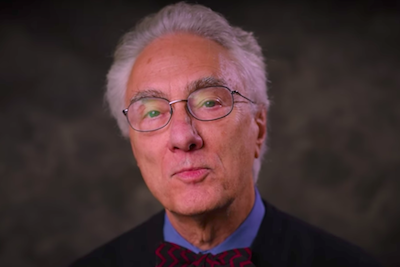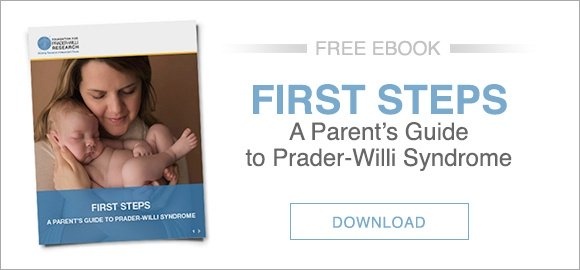 Many may remember Dr. Rudolph Leibel’s presentation on stem cells and Prader-Willi Syndrome (PWS) at the FPWR Research Conference in November 2014. He also published a breakthrough discovery in the Journal of Clinical Investigation, with Lisa Burnett, PhD, suggesting that many PWS characteristics could be due a deficiency of the enzyme prohormone covertase (PC1), as explained in this video.
Many may remember Dr. Rudolph Leibel’s presentation on stem cells and Prader-Willi Syndrome (PWS) at the FPWR Research Conference in November 2014. He also published a breakthrough discovery in the Journal of Clinical Investigation, with Lisa Burnett, PhD, suggesting that many PWS characteristics could be due a deficiency of the enzyme prohormone covertase (PC1), as explained in this video.
Dr. Leibel is the recipient of two recent grants from FPWR, whose goal is to make human neuron cells from patients with PWS. With these special cells, which are just like the ones contained in the brain’s hypothalamus, Dr. Leibel hopes to figure out how PWS works at the molecular and cellular level in the human brain. We recently were fortunate to have the chance to chat with Dr. Leibel about his work and general outlook on PWS.
Training As Pediatric Endocrinologist Informs Research
Dr. Leibel is a pediatrician and pediatric endocrinologist by training. He received his medical degree from Albert Einstein College of Medicine, was a resident in Boston at both Massachusetts General and Boston Children’s Hospital, and did fellowships at Massachusetts General Hospital and MIT. He has been on the faculty at Harvard, Rockefeller, and Cornell Universities, and a professor at Columbia University since 1997, where he is currently the head of the Division of Molecular Genetics, the co-Director of the Naomi Berrie Diabetes Center, and the Christopher J. Murphy Professor of Diabetes Research. Dr. Leibel has held appointments at numerous hospitals in Boston and New York over the past four decades, and is the recipient of many honors, including being elected to the Institute of Medicine of the National Academy of Sciences.
Dr. Leibel is an international leader in the studies of obesity, the regulation of body weight, and type 2 diabetes. Notably, he played an important role in the discovery of the hormone leptin, which suppresses hunger and makes the body feel full. Although Dr. Leibel treated a few patients with PWS early in his career as a pediatric endocrinologist, his laboratory research has only turned to PWS within the last several years.
PWS Study Ties Into Broader Research of Obesity
At the intersection of molecular biology and neuroscience, Dr. Leibel’s group has recently been able to take human skin cells and convert them into stem cells (the type of cell that differentiate into more specialized cells), which can then be used to generate the type of neurons that are contained in the hypothalamus region of the brain. Dr. Leibel recognized that PWS represents a unique and well-defined scenario leading to obesity, a disorder in which the general role of the hypothalamus in of obesity and dysfunctional hunger-related behaviors was very likely. Therefore, his group at Columbia has been generating hypothalamic neurons from the skin cells of individuals with PWS deletions of different sizes on chromosome 15, and looking closely at the behavior of such neurons in relation to healthy neurons with no deletions.
Intriguingly, the properties of the neurons from a patient with a small “micro-deletion” containing a gene called SNORD116 gene are extremely similar to those generated from PWS patients with more typical, larger deletions. This result suggests that the deletion of the SNORD116 gene may be critically important for much of the “phenotype” (i.e., observable traits) of PWS — at least regarding excessive hunger. Right now, Dr. Leibel, his postdoc Liheng Wang and graduate student Lisa Burnett are looking very carefully at how genes are expressed in the hypothalamus neurons they produce, trying to figure out the basic cause at the molecular biological level for the problems associated with PWS. Support from FPWR has been critically important for this project, helping it to get off the ground at the beginning, and providing support for ideas that might have been deemed “risky” but are now clearly paying off.
Powerful Tools to Measure How Brain Regulates Food Intake
While it is difficult to pinpoint an exact timescale for when these basic research experiments will translate into specific therapies and treatments for PWS, Dr. Leibel is extremely optimistic for the PWS community. He feels that it is a great time to be studying the neuroscience of the control of body weight, as the tools of neuroscience for understanding how the brain regulates food intake are becoming much more powerful, coupled with novel methods from genetics, optogenetics, and more. Having met PWS families at the FPWR conference, Dr. Leibel also expressed deep respect for how well informed they are on the particulars of the disorder, and for their passion in trying to eliminate the challenges associated with PWS.
Medicine — and even endocrinology — definitely runs in the Leibel family. Both of Dr. Leibel’s daughters are doctors: Natasha is a pediatric endocrinologist, and Alexis is a dermatologist. With such a great role model, perhaps this fact is not too surprising!








